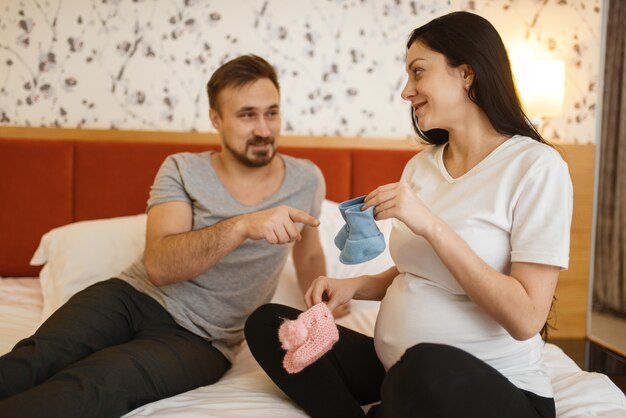What does first trimester pregnancy mean?
Pregnancy is divided into three months or periods also known as second trimesters. As for pregnancy, a trimester is just about four months but in fact it is around three and a half months or thirteen weeks. A full term pregnancy is one that takes 40 weeks or between nine and 10 months.
It is in weeks that your healthcare provider will discuss fetal development with you. Pregnancy first trimester or first three months is up to the thirteenth week of pregnancy.
Perhaps surprisingly, your pregnancy actually starts on the first day of your last menstrual cycle. This is referred to as gestational age of pregnancy. A pregnancy care provider estimates how many weeks pregnant you are are by counting 40 weeks from the onset of your first menstrual cycle.

The first couple of weeks of pregnancy occur during your menstrual cycle; the first week is your period while the second week is ovulation. Once you release your egg, it has to move through your fallopian tube to your uterus. At the third week of pregnancy, the fertilized egg moves to the uterus.
As it is leaving the fallopian tube, to get to your uterus, it continues to grow and split into more cells.
Once you have it in your uterus, it burrows into your uterine wall. This makes the body understand that the woman is pregnant and this leads to some reaction to take place.
There are many changes in both your body and feeling during the first trimester of pregnancy. It’s often very stressful and your head is filled with questions and thinking about things going on around us. Moreover your hormones are up. More to the point, it has estimated that your body puts out as much estrogen in one pregnancy as you will in a lifetime if you are not pregnant.
Your healthcare supplier will discuss fetal development in terms of the week.
What should I avoid in my first trimester?
First week is very crucial for you. There are undoubtedly a lot of changes going on, and yet you may not look or feel pregnant at all.
If you are not currently seeing a healthcare provider or pregnancy care provider, the state advises that you get one as soon as possible. Being treated early when pregnant can help you since you might be at risk of developing some complications. Get as many questions as you can and be prepared for your first meeting or session.
There are various forms of maternity care professionals that attend to you when expectant, in labor, giving birth, and after birth. These are obstetricians, mid-wives, and sometimes the primary care provider. Besides choosing a pregnancy care provider, people also choose places to deliver the baby.
First trimester of pregnancy
In the first month many structures develop and it is also the time when the fertilized egg implants itself in the uterus. This structure is just a smoothed cell mass, but later will development in amniotic sac, placenta and umbilical cord. A tube that develops into the fetal brain and spinal column and heart and circulatory system. A face appears two circles for eyes and the beginning of the mouth show through.
Eighth week of pregnancy
During the sixth week of pregnancy some of the body organs start developing and these include fetal lungs, heart, ears as well as the arms and legs. Tissue is replaced by bones all over the body and so the arm also gets converted into bonier form. They don’t have a proper head, it is large in comparison with the rest of the body, but it looks more like a human head now. It even has a separate mouth, nose and face we have to learn that there is a fetus that has a mouth and a separate nose and face. Some providers perform a first ultrasound to check for heartbeat during this time.
Weeks nine to 12 of pregnancy
At the beginning of the 13th week of pregnancy, the fetus will have toes, fingers and nails. It will begin to crawl and gesture with its hands and mouth open and close. The urinary and digestive system of the fetus is also functional. Journal of Obstetrics & Gynecology Canada:
A Doppler can be used to listen to your baby’s heartbeat after 12 weeks of pregnancy. It also has either a vagina or a penis at this point (though your provider can’t see it on an ultrasound).
What makes the first three months pregnancy crucial?
The first trimester is so important because all of the fetus’s major organs and body systems are formed. During this period only toxins, harmful substances and infections are fatal to fetal development and growth. It may raise your baby’s chances of being born with a birth defect.
What screening tests can be done in the first trimester of pregnancy?
Pregnancy checkups, ratifying screenings and other tests enable the fetus and the mother to be healthy. Pregnancy care is known as prenatal if given before the delivery of the birth and perinatal if given just at the time of birth of the baby. A Ginger imaging study showed, prenatal care appointments are vital because your pregnancy care provider explains about the things that are involved in pregnancy and childbirth, conducts examination and tests and addresses any queries that you may have.
Your first prenatal visit
You will attend between two and three prenatal appointments in the first trimester. This may be different from the insurance that you hold or if you are feel that you are a high risk pregnancy. Based on your experience, you will be expected to be interviewed concerning your past medical history, medical history of your ovaries and uterus, previous pregnancies or births, and family history capable of affecting your pregnancy. This visit is considerably more inclusive in an effort to guarantee that you are healthy, in addition to the developing fetus.









